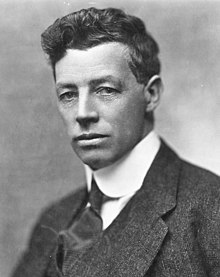Crawford Vaughan
Crawford Vaughan | |
|---|---|
 Vaughan in 1910 | |
| 27thPremier of South Australia | |
| In office 3 April 1915 – 14 July 1917 | |
| Monarch | George V |
| Governor | Sir Henry Galway |
| Preceded by | Archibald Peake |
| Succeeded by | Archibald Peake |
| Leader of the Opposition in South Australia | |
| In office 14 July 1917 – 1917 | |
| Preceded by | Archibald Peake |
| Succeeded by | Andrew Kirkpatrick |
| In office 26 July 1913 – 3 April 1915 | |
| Preceded by | John Verran |
| Succeeded by | Archibald Peake |
| Leader of the United Labor Party | |
| In office 26 July 1913 – 12 February 1917 | |
| Preceded by | John Verran |
| Succeeded by | Andrew Kirkpatrick |
| Personal details | |
| Born | 14 July 1874 Adelaide,South Australia,Australia |
| Died | 15 December 1947(aged 73) Sydney,New South Wales,Australia |
| Political party | United Labor Party(1905–17) National Labor(1917–18) Independent(1918) |

Crawford Vaughan(14 July 1874 – 15 December 1947) was an Australian politician, and thePremier of South Australiafrom 1915 to 1917.[1]He was a member of theSouth Australian House of Assemblyfrom 1905 to 1918, representingTorrens(1905–1915) andSturt(1915–1918). Elected for theUnited Labor Party,he served asTreasurerin theVerrangovernment, succeeded Verran as Labor leader in 1913, and was elected Premier after the Labor victory at the1915 state election.[2][3]
Vaughan's career was curtailed by the1916–17 Labor splitover conscription in World War I, as Vaughan and other supporters of conscription were expelled from the Labor Party in early 1917. Vaughan continued in office until July heading a minority government of the splinterNational Party;however, his government was then ousted by the conservativeLiberal Unionopposition ofArchibald Peake.The National Party went into coalition, serving under Peake as junior instead of senior partner, but Vaughan did not take a ministerial portfolio, spent most of his remaining term overseas, and was defeated at the1918 electionafter launching a last-minute campaign as an independent candidate.
Early life
[edit]Vaughan was born inAdelaide,the son of government photolithographer Alfred Vaughan.[4]He was educated at the Norwood and Marryatville public schools and thenPrince Alfred College.After leaving school, he worked forElder, Smith & Co. Ltdfor four years.[5]
Politics
[edit]Vaughan was elected to the House of Assembly at the1905 state election,winning a seat for theUnited Labor Partyin the five-memberTorrensat the age of 30. He had previously made two unsuccessful attempts for office: as aFree Trade Partycandidate for theAustralian House of Representativesat the1901 federal election,and as an independent candidate for theAustralian Senateat the1903 federal election.He became party whip in 1909, and was promoted to Cabinet asTreasurerwhenJohn Verranled Labor to victory at the1910 election.[5]He was elected leader of the Labor Party when Verran resigned in 1913 following the Labor defeat1912 election.
Vaughan and Labor defeated theLiberal Uniongovernment led byArchibald Peakeat the1915 election,with 26 of 46 seats in theHouse of Assembly.At the time, he was the youngest Premier in Australia at the age of 40.[5]His brother,John Vaughan,became hisAttorney-General.His government improved the education system by restructuring the department's senior bureaucracy, by extending the years of compulsory school attendance and by providing better facilities for the intellectually and physically disabled. The government legislated to allow women to serve in the police force and asjustices of the peace,while it also improved workers' access to the arbitration system and diminished the court's punitive powers against trade unions. Awheat poolwas created, as were land and housing schemes for war veterans. However, the government also passed a law designed to closeLutheranprimary schools.
He resigned from the Labor Party in 1917 in support ofBilly Hughes' proposal forconscription,and was a founding member of theNational Labor Partyin 1917.Andrew Kirkpatrickreplaced Vaughan as leader of the official Labor Party. Vaughan remained as premier atop a minority government until 1917, when his government was defeated in parliament over the conscription issue, with Peake becoming Premier for a third time.
Vaughan spent the last months of his term on a speaking tour of the United States, at the invitation of PresidentWoodrow Wilson.[5]He made a last-minute decision to recontest his seat the1918 electionas an independent, while still overseas – despite having formally been leader of the National Party until that point. However, he was unsuccessful in holding his seat, and retired from South Australian politics.
Outside politics
[edit]Crawford had a literary bent: he was a freelance journalist and for a time editor ofQuiz[6]before taking up politics, and in later life had two books published:Golden Wattle Timepublished in Sydney 1942 by Frank Johnson andThe Last of Captain Blighpublished in London 1950 by Staples Press. He was also the author of radio scripts.[7]
He moved toSydneyafter leaving parliament, where he developed a number of business interests. In retirement, he devoted much of his time to his literary interests. He died at his home in Sydney in 1947, and was awarded a state funeral by the government of South Australia.[5]
Family
[edit]In 1906 he married Evelyn Goode, sister of parliamentary colleagueClarence Goode.After her death in 1927 he remarried in 1934 toMillicent Preston-Stanley,the first woman to be elected to theParliament of New South Wales.[5]
Notes
[edit]- ^"Hon. Crawford Vaughan".Members of theParliament of South Australia.Retrieved26 January2016.
- ^"Mr. Crawford Vaughan Elected Leader (26 Jul 1913)".The Chronicle.Adelaide. 26 July 1913.Retrieved30 June2016– via Trove.
- ^"THE LABOR SPLIT".The Advertiser.Adelaide. 13 February 1917. p. 7.Retrieved17 January2015– via Trove.
- ^"Nearly 80 Years of Age".The News.Vol. XII, no. 1, 770. South Australia. 18 March 1929. p. 2.Retrieved11 April2019– via Trove.mentions various prominent family members
- ^abcdef"Mr. Crawford Vaughan".The Advertiser.Adelaide. 16 December 1947. p. 3.Retrieved26 January2016– via Trove.
- ^"City Scratchings".Kapunda Herald (SA: 1878–1951).SA. 17 August 1906. p. 5.Retrieved13 January2015– via Trove.
- ^Arnold, JohnThe Bibliography of Australian Literature, Vol 4, P-Zp. 586 University of Queensland Press 2009ISBN0702240311
References
[edit]External links
[edit]- "Vaughan, Crawford".Former members of theParliament of South Australia.Retrieved19 August2022.
